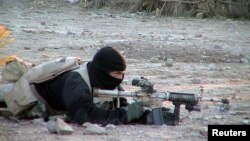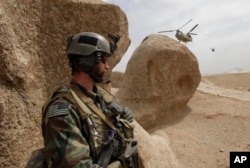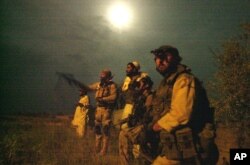A continuous, heavy reliance on the most elite U.S. forces is threatening to erode what many officials now see as an increasingly indispensable set of military capabilities.
Already on the front lines in the battle against terror groups such as Islamic State and al-Qaida, U.S. special forces are increasingly being called upon to help combat a growing variety of threats from state and nonstate actors at a pace that Pentagon officials fear may not be sustainable.
"We've been operating at such a high op-tempo for the last decade-plus," Theresa Whelan, acting assistant defense secretary for special operations and low-intensity conflict, told the House Armed Services Committee on Tuesday. "We've mortgaged the future in order to facilitate current operations.
"That has impacted readiness and it's also impacted the development of the force for the future. And as the threats grow, this is only going to get worse," she added.
Deployed
Approximately 8,000 U.S. special operations forces are currently deployed to more than 80 countries, according to U.S. Special Operations Command (SOCOM).
That figure includes high-profile missions in Syria and Iraq, where about 600 special operations forces have been working with local partners to help defeat IS.
Special operations forces have also been playing a key role in Afghanistan, where just last week two Army Rangers were killed in a large raid with Afghan counterparts that is thought to have killed the leader of IS in that country.
Additionally, SOCOM has been given new responsibilities, taking the lead in coordinating military actions against terrorist organizations and also maintaining the Defense Department's efforts to counter the spread of weapons of mass destruction.
"Special operations forces are more relevant than ever," SOCOM Commander General Raymond Thomas told lawmakers. "The evolution, the change in terms of the threat environment, is almost kind of at a frantic level in terms of number of threats."
But Thomas and Whelan cautioned that the additional responsibilities combined with a larger role on the ground, in many areas, have led to increased strain, especially in a tight budget environment.
In some cases, support staff has taken a hit, Whelan said.
"In fact, we have actually downsized because of requirements for downsizing of the federal workforce, particularly major headquarters organizations," she told lawmakers.
Funding
Officials also worry about the lack of certainty when it comes to funding.
Nearly 30 percent of SOCOM's money comes from the Overseas Contingency Operations (OCO) budget — meant to help fund current military operations. But SOCOM said the vast majority of that money pays for long-term functions or capabilities.
The renewed concerns about special operations funding came the same day President Donald Trump touted a $20 billion military spending increase, included in a bill expected to be approved by the House of Representatives this week.
"We are at last reversing years of military cuts and showing our determination and resolve to the entire world," Trump said Tuesday while welcoming the U.S. Air Force Academy football team to the White House Rose Garden. "These long-awaited increases will make America more safe and more secure and give our amazing service members the tools, equipment, training and resources they need and they very much deserve."
Still, the impact when it comes to stabilizing SOCOM funding is unclear, as the military spending increase includes billions of dollars for OCO.
But even if funding is stabilized, there remain deep and long-standing concerns about trying to do too much with not enough, possibly pushing special operations force (SOF) troops past their breaking point.
"SOF leaders are worried about that," a former SOCOM staff officer warned VOA last year, pointing to a continuous surge in the number of missions over the past 15 years.
"They continually say 'yes,' " the officer said. "When do we say 'no' in contemporary times to be able to say 'yes' to perhaps something more critical in the future?"






